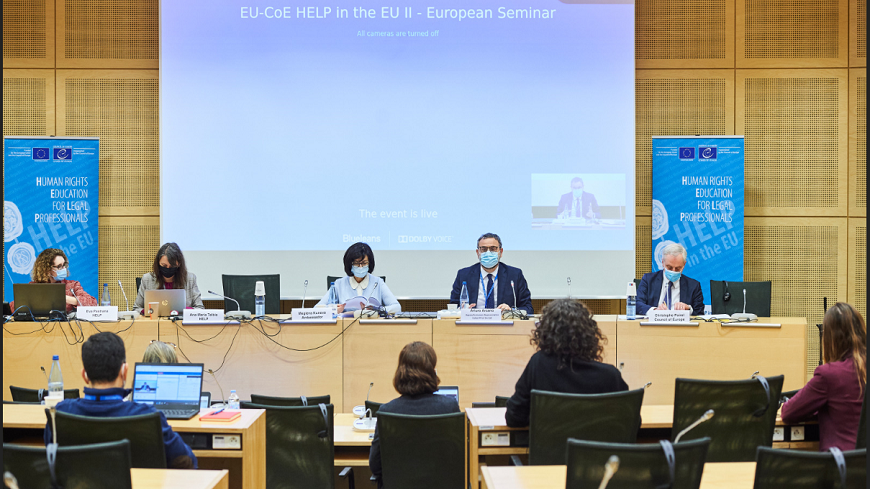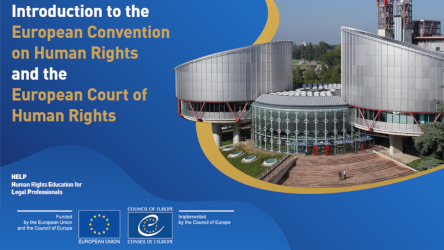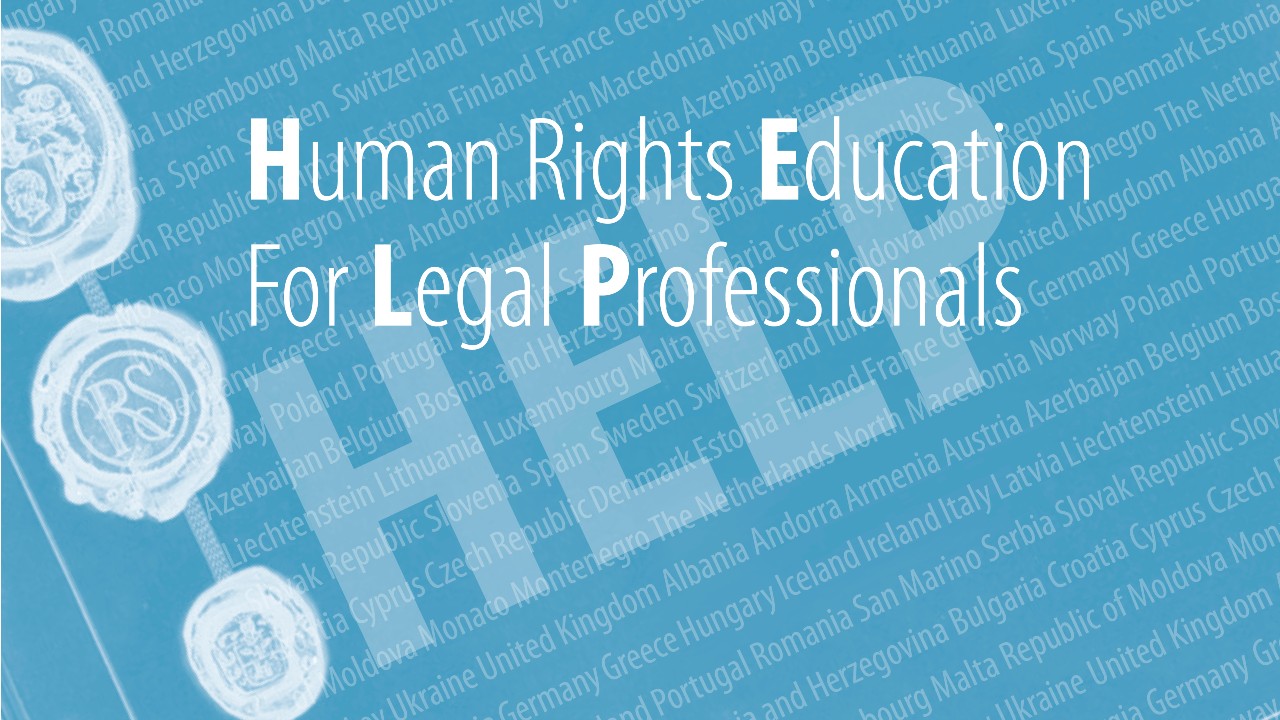On 20-21 January 2022, the HELP in the EU Contact Points Meeting, organised online under the European Union (EU)-Council of Europe (CoE) ‘HELP in the EU II’ project, gathered over 80 members of the HELP Network, representatives of National Training Institutions (NTIs) for judges, prosecutors as well as of National Bar Associations (BAs) from EU Member States, HELP tutors and key stakeholders at EU level, but also beyond.
The meeting was opened by Arturo Arcano, Deputy Permanent Representative of the Italian Permanent Representation at the Council of Europe (CoE), who welcomed the participants and reflected upon the relevance of human rights training for legal professionals in Europe, drawing from the outstanding results achieved in Italy through the use of HELP courses (. He also reiterated the priorities of the Italian Chairmanship of the Committee of Ministers of the CoE.
Christophe Poirel, Director of Human Rights, Human Rights and Rule of Law Department of the CoE, showcased the EU-CoE HELP in the EU II Project as an outstanding example of joint cooperation between the CoE and the EU, providing a unique platform of interaction between the representatives of legal professions (judges, prosecutors and lawyers) with the aim to better protect human rights on a national level. He expressed gratitude for the backing of HELP’s key allies, particularly, the EU as a strong political and financial partner, as well as the project partners from the EU MS. He concluded by reiterating the importance of building a relationship of trust and cooperation with national partners in order to facilitate the dissemination of knowledge.
Ambassador Meglena Kuneva, Head of the EU Delegation to Strasbourg, emphasised the importance of judicial training as a precious tool to spread and preserve the EU-CoE shared values and to promote the respect of human rights and rule of law, giving new impetus to European democracy and labelling HELP Programme as a “world standard”.
Eva Pastrana, Head of the Justice and Human Rights Division at CoE presented recent HELP developments and initiatives, including those related to EU-funded projects and with partners such as the European Judicial Training Network (EJTN), the Council of Bar and Law Societies in Europe (CCBE), the EU Agency on Fundamental Rights or the UNHCR. She also briefed the audience on the results of the EU-CoE project, jointly implemented with the Confederation of European Probation “Radicalisation Prevention, Judicial Response to Terrorism and International Cooperation in Criminal Matters Project (ICCM)” including the newly updated HELP course on ICCM and a follow-up project proposal jointly submitted by the CoE and the Italian Bar Council.
The key achievements of the EU-CoE HELP EU II project, ending in February 2022,were presented to the participants by Ana-Maria Telbis, coordinator of the project. Impressively, over 1200 participants were enrolled in more than 53 tutored courses launched during the project. Hence, she underlined the efficiency of the HELP Methodology, reflected in the participants’ motivation as well as in the training effectiveness. Julen Fernandez Conte, HELP Info Point for Spain and Head of Brussels Office of the Spanish Bar Council (CGAE), focused on the good practices drawn from the training of lawyers in Spain and the use of HELP courses.
Through the project, a new course on Ethics for Judges, Prosecutors and Lawyers was developed and already translated and successfully launched in several EU MS. Five other courses were updated: Asylum and the ECHR, The fight against racism, xenophobia homophobia and transphobia, Labour Rights as Human Rights, Rights of Persons with Disabilities. All the courses were presented respectively in the follow-up session, by Nuria Diaz Abad, Coordinator of the HELP course on Ethics and former ENC President; Delphine Leneutre, Legal Associate at the UNHCR Representation to the European Institutions in Strasbourg); Zeynep Usal Kanzler, from the European Commission against Racism and Intolerance (ECRI) Secretariat; and Ana-Maria Telbis, Project Coordinator who focused on the HELP courses on Labour Rights and on Rights of Persons with Disabilities.
The participants who have joined the HELP Network in the recent months as Focal of Info Points had the occasion to introduce themselves and share their impressions and expectations.
The first day ended with a session on the HELP impact beyond the project, with Ana Medarska Lazova and Valentina Boz from the HELP Programme presenting results related to HELP courses developed under the project but implemented beyond the EU, as well as other HELP actions/course launches in the EU MS.
The second day started with a session on the integration of HELP courses in national training curriculae for judges, prosecutors and lawyers, with examples presented by Florence Gilbert, Ecole Nationale de la Magistrature, France; Laurent Pettiti, Délégation des Barreaux de France (DBF) and HELP Info Point for France; Gianluca Grasso, SSM, HELP Focal Point for Italy; Giovanni Pansini, CNF, HELP Info Point for Italy. Speakers shared models applied, good practices and lessons learned during the implementation/use of HELP courses. Several examples of HELP courses integration in other EU MS training offer for judges, prosecutors and lawyers were mentioned.
The morning continued with examples of cooperation with the EU and European partners in boosting human rights training in the EU MS. Wojciech Postulski, from DG JUST, European Commission, referred to the EU Strategy on the Training of Justice Professionals and focused on the European Training Platform; Sandra Aigner-Accardo, Programme Officer, Technical Assistance and Capacity Building Unit, FRA, made an overview of the resources developed by the EU Fundamental Rights Agency and Monica Marti Garcia, Senior Project Manager, EJTN, presented the cooperation between the HELP Programme and the European Judicial Training Network.
Szymon Janczarek, from the Execution of Judgments Department, CoE, Carolina Lasen Diaz, from the Office of the SRSG on Migration and Refugees, CoE, and Andriana Kostopoulou, GREVIO Member and HELP Info Point for Greece, highlighted the effective use of HELP courses to enhance compliance with European standards at national level in their respective areas of work.
The last session was dedicated to HELP plans for the future and discussion on mapping priorities for HELP activities in EU MS. Activities planned under the EU-CoE ‘HELP in the EU III’ project, starting on 1 March 2022, will take into consideration the expressions of interest of various national partners in launching courses, at national and cross-border level. A new course on the Interplay between the ECtHR and the EU Charter of Fundamental Rights will be developed and several existing HELP courses will be updated, translated and adapted to be launched. This will contribute to expanding the training offer of judges, prosecutors and lawyers in EU MS with topics of interest and relevance to their professional context, with the aim to enhance the effective application of European human rights standards in the EU.
In their closing remarks, Eva Pastrana stressed the need for mutual trust and cooperation between HELP and its partners at national and European level.
During the breaks, participants could watch several presentation videos of HELP courses recently developed/updated with EU funding. The courses are all available on the Council of Europe HELP e-learning platform, containing over 40 courses translated in several languages that can be taken for free and in a self-paced format. Upon completion, participants can obtain a Statement of Accomplishment directly generated through the platform.
Ethics for Judges, Prosecutors and Lawyers : eng | fra | ell | ita | lit | spa | svk
Asylum and Human Rights - 2021 Edition: eng | fra | bul | ita
Fight Against Racism, Xenophobia, Homophobia and Transphobia – 2021 Edition: eng | fra | bos | bul | ell | ron
International Cooperation in Criminal Matters - 2021 Edition: eng | bul | ita
Labour Rights as Human Rights - 2021 edition: eng






